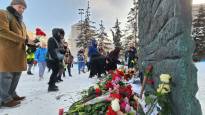On Saturday, Russians still carried flowers to the memorials. The grips of the police seemed to get tougher as the day went on.
MOSCOW At the foot of the monument to the victims of political persecution, on Saturday morning, more and more flowers kept growing as Muscovites came to remember Alexei Navalny.
Muscovite Denis said that the news of the death came from Å¡okkina, which he didn’t even want to believe. He hoped that there would still be some hope of change.
A policeman walked through the crowd with a megaphone and spoke to “respectable citizens†. The order was that they had to move forward and not remain an obstacle for others.
Sculptor Georgi Frangulyanov and an architect Andrei Frangulyanov the monument Stena skorbi, or the Wall of Grief, was erected in the square near the ring road surrounding the core of Moscow, or the Garden Ring, in 2014–17.
Now, at its foot, an opposition politician who died in a Siberian penal colony on Friday was remembered.
There were several police troop transport vehicles on the nearby street. It was clear that the authorities were not going to allow any open protest.
Later in the evening, the first arrests were reported from the square. The police were said to have formed a chain in front of the statue to prevent flowers from being brought.
Flowers gathered again on the stone of Solovetsk
In Lubyanka Square, in the shadow of the massive headquarters building of the security service FSB, citizens carried flowers to the Solovetsky Stone, a memorial to the political persecutions of the Soviet Union. The authorities had cleaned up the flowers brought in on Friday evening.
– We experienced very difficult emotions, and they are difficult to describe, for understandable reasons, Jelena said.
He said that Navalnyi was a very brave person, so he wanted to pay tribute to that courage.
An elderly Muscovite Mikhail said that Navalny’s death also came and did not come as a shock to him.
– It wasn’t a shock to the extent that I realized that’s what it was going to be.
On the other hand, the knowledge of Navalny’s death seemed to him the same as the beginning of the current war.
– Such a feeling of disaster, Mihail described.
Despair and hope
Also in Lubjanka Square, the police made sure that no large crowd would form in the square. The police officers asked those who brought flowers to walk towards the corridor leading to the Lubjanka metro station.
Mihail guessed that no major protests were expected.
– Flowers are brought by a minimal number of people. Of course, this is not the president’s electorate, Mihail said to Vladimir Putin referring to.
In Mihail’s opinion, Navalny’s death was a way to show people that everyone has a reason to sit in their kitchens and keep quiet. He was pessimistic about the future of Navalny’s movement.
– All the most important characters have left. Those who remained have gone there, Mihail said, pointing in the direction of the FSB headquarters.
Muscovite Aniseed instead believed that Navalny’s death could act as a catalyst that would still lead to major changes.
He said that Aleksei Navalnyi was the strongest person he had ever seen.
– In all those photos where she looks sickly, withered, she still finds strength in smiling, Anisija said.
– That person’s power didn’t disappear with him, it stayed with all of us.
